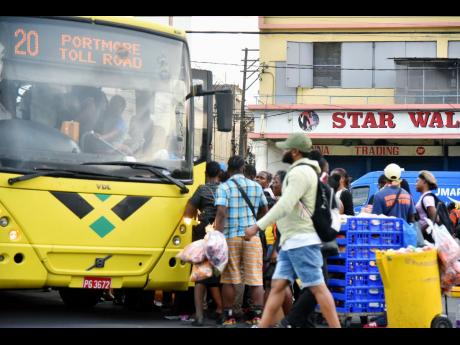JUTC eyes fleet relief as bus woes grind on
A grave bus shortage hobbling the state-owned Jamaica Urban Transit Company (JUTC) could be eased by March.
The bus company transports almost 350,000 passengers weekly but its operations have been impacted by the non-delivery of 50 new units.
The Government had signed, in May 2022, a US$6.4-million contract to boost its fleet.
According to the contract inked with J.R. Wellington Import and Export Limited, the new vehicles were expected to be delivered within six to nine months, starting in the final quarter of 2022.
Disclosing that the company has not had any injection of new buses over the last five years, JUTC Corporate Communications Manager Cecil Thoms said the vehicle deficit affects its entire network.
“We don’t just have a bus shortage in one, we have a bus shortage in all of our locations,” Thoms said in a Gleaner interview Wednesday.
Thoms said he was “not advised” as to the specific source of the delay in the delivery of buses but cited ongoing shipping challenges as a cause for concern.
“Throughout the period of COVID, and even up until now, there have been serious logistics concerns delaying the shipping of parts especially,” the communications manager said.
“We are hoping that we will be able to cauterise any kind of challenges, not saying that it is a cure-all, but it will definitely help in alleviating the delays, for example, that people have been experiencing and in some instances the lack of units.”
According to Thoms, just over 200, or approximately half, of the 419 buses that make up its fleet 200 are operational.
The transport company requires at least 500 functional buses to operate at optimal capacity.
“The age of our fleet is an average of about 12-15 years, and in addition to that, we have not had any injection of any brand-new buses in more than five years, so we clearly understand the complaints by customers,” he said.
“Some of them would have been down because of not having the kinds of parts available, and as a result of accidents that would have taken place over time,”
In the meantime, Thoms is pleading for patience from the commuting public.
“The people have been bearing with us, and we’re appealing to them to just continue to support us as we work through this particular issue right now,” he said.

